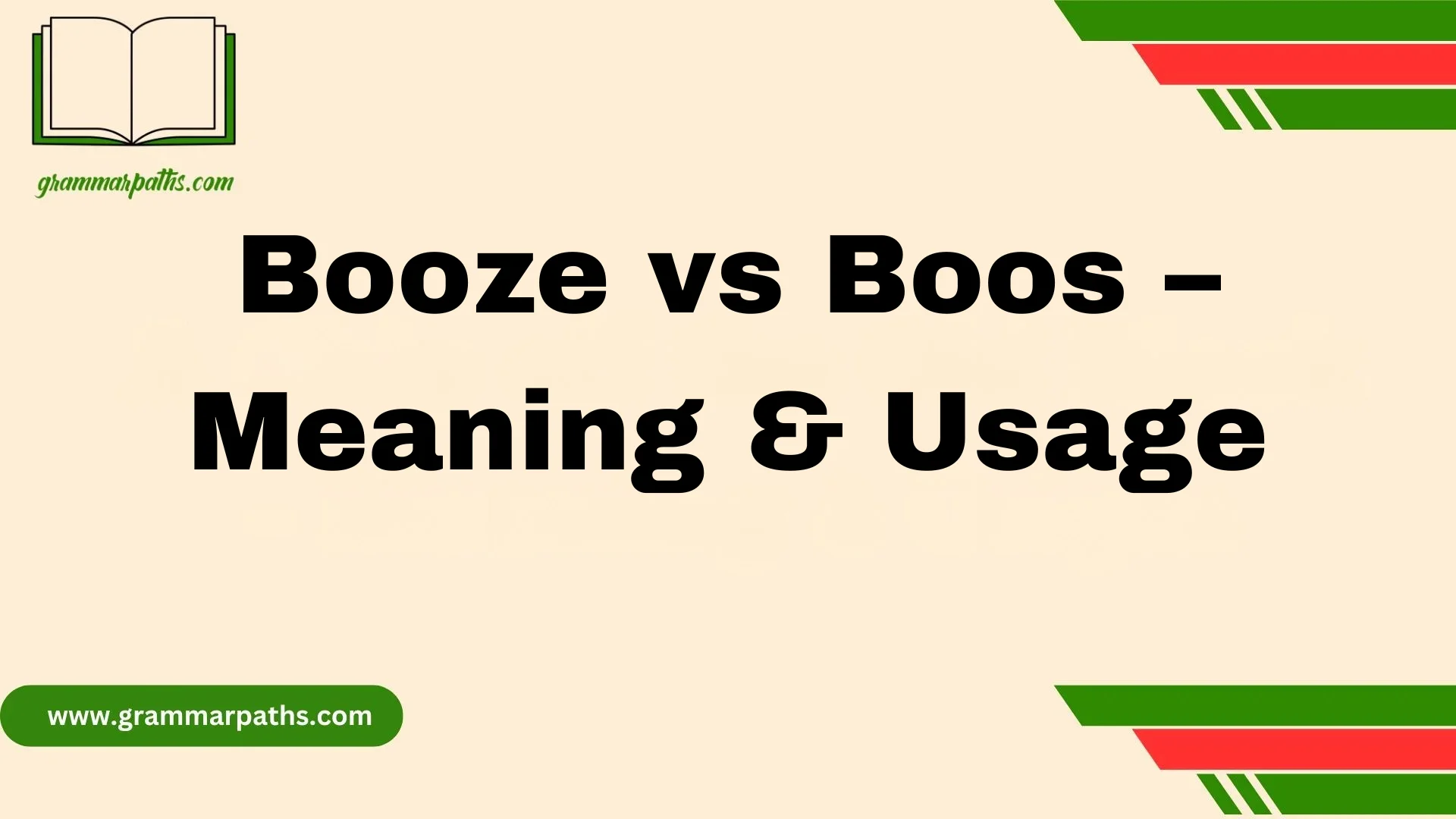It’s easy to make a funny mix-up when writing quick captions, especially if booze and boos are involved. In one party post, what I meant as a celebration accidentally suggested disapproval, and the crowd reaction was full of mixed reactions. In “Booze vs Boos – Meaning & Usage,” the message can fall apart fast if the sound of two words is the same, but the context, meanings, and tone are confused. A good story can become embarrassing with the wrong expression or misunderstood tone. I’ve had to catch and learn quickly while working with media teams on captions to avoid these slips.
A simple slip in a social post can lead to unintended jokes or confusion. Relying on spellcheck doesn’t always help, and while you may get a laugh, the audience may also miss your point. The right words, especially with tricky usage, deserve a second look. Whether it’s a caption, joke, or trying to show the difference between homophones, one sentence can shift entirely with a tiny spelling change. Always double-check and be ready to respond. A quick guide helps reduce confusion out there when you announce something. Take this example: it’s easy to mix up confusing slang when it’s heard in loud parties with flowing alcohol. Misusing boos instead of booze might suggest disapproval rather than fun. The more you understand the clear use of words, the better your flow during chatting or writing becomes.
What Are Homophones, Really?
Homophones are words that sound alike but have different meanings and spellings. Think of them as twins with completely opposite personalities. They may sound the same, but they act very differently in a sentence.
Here are a few classic examples:
- Two / Too / To
- Their / They’re / There
- Bare / Bear
- Flour / Flower
These word pairs trip up even native English speakers. That’s why understanding homophones—especially ones like booze and boos—can really improve how you write, speak, and text.
What Does “Booze” Mean?
Booze is a slang word for alcohol. Simple as that.It’s an informal way to refer to beer, wine, cocktails, or any kind of alcoholic drink.
Definition of Booze:
Booze (noun): Alcoholic beverages, usually used in casual or slang contexts.
Booze (verb): To drink alcohol, often heavily or socially.
Where Did the Word Come From? (Etymology)
The word booze goes way back to the Middle English word “bouse”, which came from the Dutch busen, meaning “to drink to excess.” Over time, the word evolved into “booze,” and by the late 1800s, it became popular slang in American English.
How “Booze” Is Used in Sentences
Using “booze” in conversation or text is super common. Just remember—it’s slang, so it’s not the best choice for formal writing.
Here are some everyday examples:
- “We’re stocking up on booze for the weekend.”
- “I don’t drink booze anymore—too many hangovers.”
- “The party was wild. Too much booze, not enough food.”
Quick Fact:
The word boozy is an adjective that means “affected by alcohol” or “related to drinking.” Example: “a boozy brunch.”
What Does “Boos” Mean?
This is where things get interesting. The word boos has two completely different meanings, depending on how it’s used.
Definition of Boos (Plural of “Boo”):
- Boos (noun, plural): The sound people make when they’re disapproving or booing someone.
- Boos (slang): Shortened from “boo,” which is a term of endearment, especially in romantic or affectionate contexts.
Boos as Jeers or Disapproval
Think about sports games, talent shows, or political rallies. If the crowd doesn’t like something, what do they do?
They boo.So the plural of that reaction is boos.
Examples in Sentences:
- “The bad referee call got loud boos from the crowd.”
- “The movie ending was so bad it earned boos from the audience.”
This version of boos is all about negative crowd reaction—no alcohol involved.
Boos as a Term of Affection
This second meaning has exploded thanks to pop culture and social media.
Calling someone your boo is a slang way of saying they’re your significant other, crush, or someone you’re romantically connected to.
So boos can mean multiple romantic partners (or just be playful slang among friends).
Examples:
- “My boos surprised me with cupcakes and flowers today.”
- “Where are all my boos at?”
Cultural Reference:
In Destiny’s Child’s song Say My Name, Beyoncé sings, “Say my name, say my name, if no one is around you, say baby I love you…”—she’s clearly talking to her boo.
Booze vs Boos: What’s the Real Difference?
Despite sounding identical, these two words couldn’t be more different in meaning or usage.
Here’s a side-by-side comparison to make it crystal clear:
| Feature | Booze | Boos |
| Type | Slang noun (and sometimes verb) | Noun (plural), also used as slang |
| Meaning | Alcoholic drinks | Jeering sounds OR romantic partners |
| Pronunciation | /buːz/ | /buːz/ |
| Usage | “Let’s buy booze.” | “The boos were loud.” / “I miss my boos.” |
| Tone | Informal slang | Casual (disapproval) or affectionate slang |
| Spelling Clue | Ends in “ze” like “fizz” (alcohol) | Ends in “s” like “hiss” (crowd noise) |
Key Takeaway:
They sound the same, but they mean completely different things.
Use context to figure out which one fits.
Common Mistakes People Make
Even fluent speakers mess these up—especially when writing fast. Here are some examples of typical mix-ups:
Mistake Examples:
- ❌ “The boos at the club were way too strong.”
✅ Should be: “The booze at the club was way too strong.”- ❌ “I could hear the crowd’s booze from outside.”
✅ Should be: “I could hear the crowd’s boos from outside.”
How to Remember the Difference
Here are a few quick memory hacks to keep things straight:
- Booze has a Z — just like buzz, and we all know alcohol can give you a buzz.
- Boos ends in S, like the hiss of a crowd or a sound of disapproval.
- Think Z for Zinfandel (a type of wine) = booze.
- Think S for shouts = boos.
Fun Facts and Pop Culture References
- 🎵 “Pass the booze!” – Common lyric in party songs and rap tracks.
- 💘 “That’s my boo.” – Popular in R&B, hip-hop, and urban slang.
- 🎃 Ghosts say “boo!” – Yes, even that gets confusing.
- 📱 On TikTok, many creators use “my boo” in captions for couple videos.
- 📚 In The Simpsons, Moe the bartender says “booze” in almost every episode he’s in.
Test Yourself: Booze vs Boos Quiz
Let’s see if you’ve mastered it.
Choose the correct word in each sentence:
- “He got kicked out for sneaking in (booze/boos).”
- “The performer received loud (booze/boos) after forgetting their lines.”
- “She calls her boyfriend her (booze/boos).”
- “Too much (booze/boos) makes me sleepy.”
- “My (booze/boos) surprised me with a vacation.”
Answers:
- Booze
- Boos
- Boo
- Booze
- Boos
Why This Matters in Real Life
Mixing up booze and boos might seem harmless, but it can lead to:
- Confusion in writing and texting.
- Embarrassing moments, especially in professional or formal settings.
- Miscommunication with people who don’t know your intent.
Real-World Example:
Imagine you’re texting your boss after a work party:
“Sorry about the boos. I had too many.”
Your boss might think you’re apologizing for heckling the event, not drinking too much. That’s why spelling—and knowing the difference—really matters.
Top Tips to Remember Booze vs Boos
Let’s sum it all up with a few quick rules.
- Booze = Alcohol. Use when talking about drinks.
- Boos = Jeers or romantic slang. Use in crowds or when being cute.
- Pronunciation is the same: /booz/
- Use context clues to pick the right one.
- Don’t trust autocorrect—it often gets it wrong.
Conclusion
Understanding the difference between booze and boos might seem like a small detail, but in writing—especially in captions, posts, and social media—every word matters. These two homophones sound the same but have totally different meanings, and using the wrong one can lead to confusion, misread tone, or even unintentional disapproval when you’re just trying to celebrate. By paying attention to spelling, context, and usage, you’ll avoid those awkward mix-ups and improve your overall communication. Whether you’re telling a funny story, responding to an audience, or sharing a joke about a wild party, knowing when to use booze or boos shows your clarity, confidence, and command of language.
FAQs
Q1: What does “booze” mean?
Booze is an informal slang term for alcohol, often used in casual conversation or when describing a party or celebration.
What does “boos” mean?
Boos are sounds of disapproval, usually made by a crowd or audience to show they’re unhappy with something.
Why are “booze” and “boos” confusing?
They are homophones—they sound the same but have different spellings and meanings, which can cause mistakes in writing or captions.
How can I avoid mixing them up?
Always consider the context of your sentence, use a good spellcheck tool, and double-check that your message makes sense.
Is it common to see this mistake online?
Yes! On social media, where people write fast and casually, confusing booze with boos is a common but avoidable mistake.
Helpful Resources to Learn More
- Merriam-Webster: Booze Definition
- Dictionary.com: Boos Meaning
- Grammarly Guide to Homophones
- Urban Dictionary: Boo

Mia Rose is the passionate writer and founder of GrammarPaths.com, a resource dedicated to helping learners master English grammar, idioms, and writing skills with ease. With a deep love for language and years of experience in teaching and content creation, Mia simplifies complex grammar rules into clear, practical guides that readers can instantly apply.












